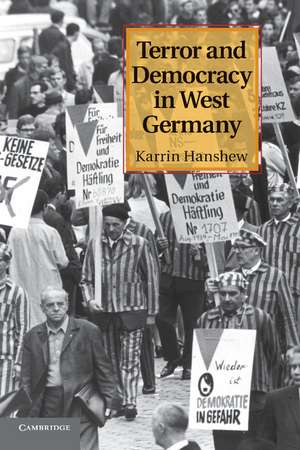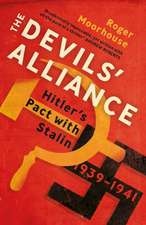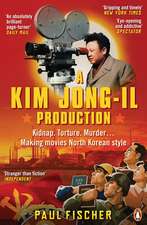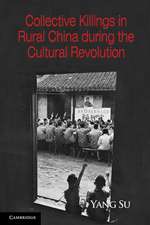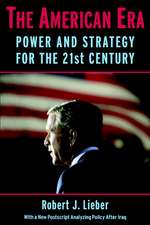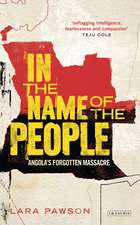Terror and Democracy in West Germany
Autor Karrin Hanshewen Limba Engleză Paperback – 20 aug 2014
| Toate formatele și edițiile | Preț | Express |
|---|---|---|
| Paperback (1) | 338.05 lei 6-8 săpt. | |
| Cambridge University Press – 20 aug 2014 | 338.05 lei 6-8 săpt. | |
| Hardback (1) | 696.80 lei 6-8 săpt. | |
| Cambridge University Press – 19 aug 2012 | 696.80 lei 6-8 săpt. |
Preț: 338.05 lei
Nou
Puncte Express: 507
Preț estimativ în valută:
64.68€ • 67.54$ • 53.41£
64.68€ • 67.54$ • 53.41£
Carte tipărită la comandă
Livrare economică 15-29 aprilie
Preluare comenzi: 021 569.72.76
Specificații
ISBN-13: 9781107429451
ISBN-10: 1107429455
Pagini: 294
Ilustrații: 10 b/w illus.
Dimensiuni: 156 x 234 x 17 mm
Greutate: 0.45 kg
Editura: Cambridge University Press
Colecția Cambridge University Press
Locul publicării:New York, United States
ISBN-10: 1107429455
Pagini: 294
Ilustrații: 10 b/w illus.
Dimensiuni: 156 x 234 x 17 mm
Greutate: 0.45 kg
Editura: Cambridge University Press
Colecția Cambridge University Press
Locul publicării:New York, United States
Cuprins
1. Democracy made militant: the Federal Republic of Germany; 2. Disobedient Germans: resistance and the extraparliamentary left; 3. 'Mister Computer' and the search for internal security; 4. The security state, new social movements, and the duty to resist; 5. The German autumn, 1977; 6. Civility, German identity, and the end of the postwar.
Recenzii
'This excellent book traces the torturous process by which West Germans negotiated the relationship between security and civil liberties in the shadow of the Nazi dictatorship. It highlights the German autumn in 1977 as a culmination point for both the Left's and Right's reconciliation with the basic institutional framework of the Federal Republic. A major contribution to the history of postwar democratization and to the contemporary debate on terror and democracy that underscores the essential role of vibrant public discourse and popular vigilance in preserving democratic freedoms.' Frank Biess, University of California, San Diego
'For many years the febrile and polarized political climate of the West German 1970s has badly needed the sober, careful assessment a first-rate historian grounded in the archives can provide. In Karrin Hanshew's new book we finally have what we need.' Geoff Eley, University of Michigan
'This is an exciting, sophisticated history of the extra-parliamentary left and of the RAF in West Germany during the 1970s. Its particular strength is the intense exploration of theoretical debates in the left milieu, mirrored by a careful analysis of government discussions about strategies of democratic self-defense against subversion. The breadth of issues considered, the nuanced style of presentation, and the authority of judgments make this an important contribution.' Konrad Jarausch, University of North Carolina
'Tracing the 'militant defense of democracy' by West German politicians and the RAF in the form of attacks against one another, Hanshew chillingly highlights the ensuing paradoxes, in the process challenging received views of democracy altogether.' Belinda Davis, Rutgers University
'Karrin Hanshew offers an intricate and intriguing look at the role of terrorism in delineating acceptable violence in a democracy … Hanshew's monograph makes an excellent case for the transformative effects of terrorism and fear and the importance of debates over security and violence to West German political culture. Her work is an interesting addition to a growing body of literature on West German civil society and political culture, as well as literature on the 1970s. Furthermore, her work is relevant to scholars of terrorism and counterterrorism … Hanshew's explanation for the transformation of West German conservatism wrought by its experience with terrorism is an important addition to the understanding the causes of the conservative turn in the early 1980s.' H-Net Reviews
'For many years the febrile and polarized political climate of the West German 1970s has badly needed the sober, careful assessment a first-rate historian grounded in the archives can provide. In Karrin Hanshew's new book we finally have what we need.' Geoff Eley, University of Michigan
'This is an exciting, sophisticated history of the extra-parliamentary left and of the RAF in West Germany during the 1970s. Its particular strength is the intense exploration of theoretical debates in the left milieu, mirrored by a careful analysis of government discussions about strategies of democratic self-defense against subversion. The breadth of issues considered, the nuanced style of presentation, and the authority of judgments make this an important contribution.' Konrad Jarausch, University of North Carolina
'Tracing the 'militant defense of democracy' by West German politicians and the RAF in the form of attacks against one another, Hanshew chillingly highlights the ensuing paradoxes, in the process challenging received views of democracy altogether.' Belinda Davis, Rutgers University
'Karrin Hanshew offers an intricate and intriguing look at the role of terrorism in delineating acceptable violence in a democracy … Hanshew's monograph makes an excellent case for the transformative effects of terrorism and fear and the importance of debates over security and violence to West German political culture. Her work is an interesting addition to a growing body of literature on West German civil society and political culture, as well as literature on the 1970s. Furthermore, her work is relevant to scholars of terrorism and counterterrorism … Hanshew's explanation for the transformation of West German conservatism wrought by its experience with terrorism is an important addition to the understanding the causes of the conservative turn in the early 1980s.' H-Net Reviews
Notă biografică
Descriere
Karrin Hanshew examines West German responses to 1970s terrorism to explain why the experience had lasting significance for German politics and society.
